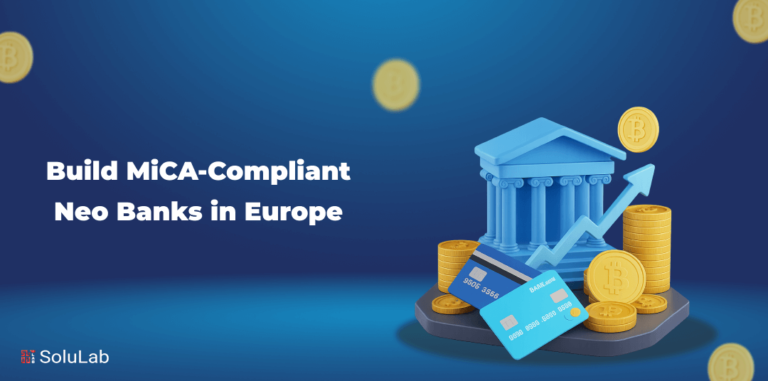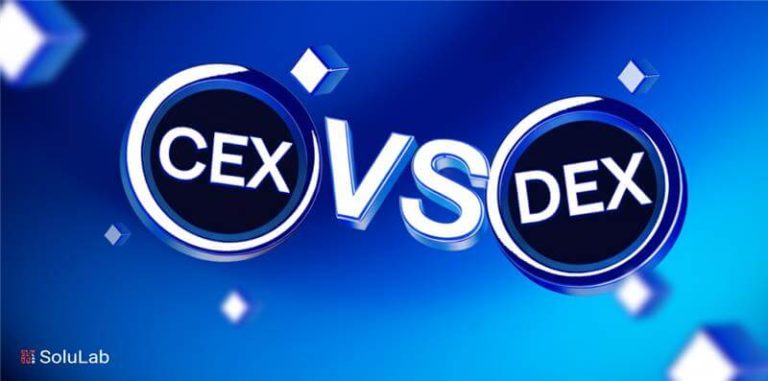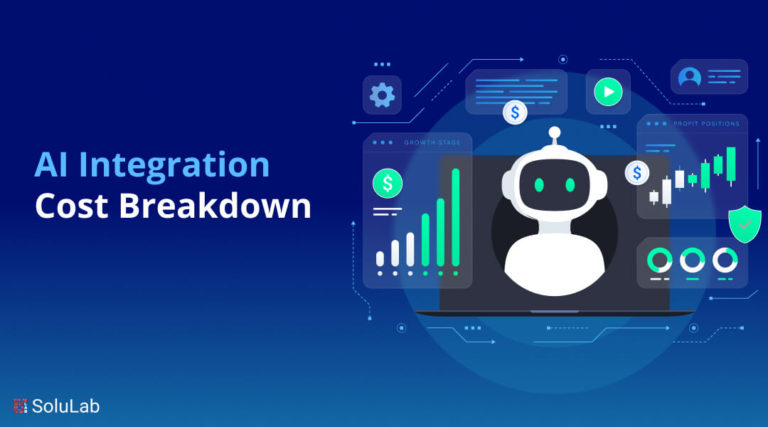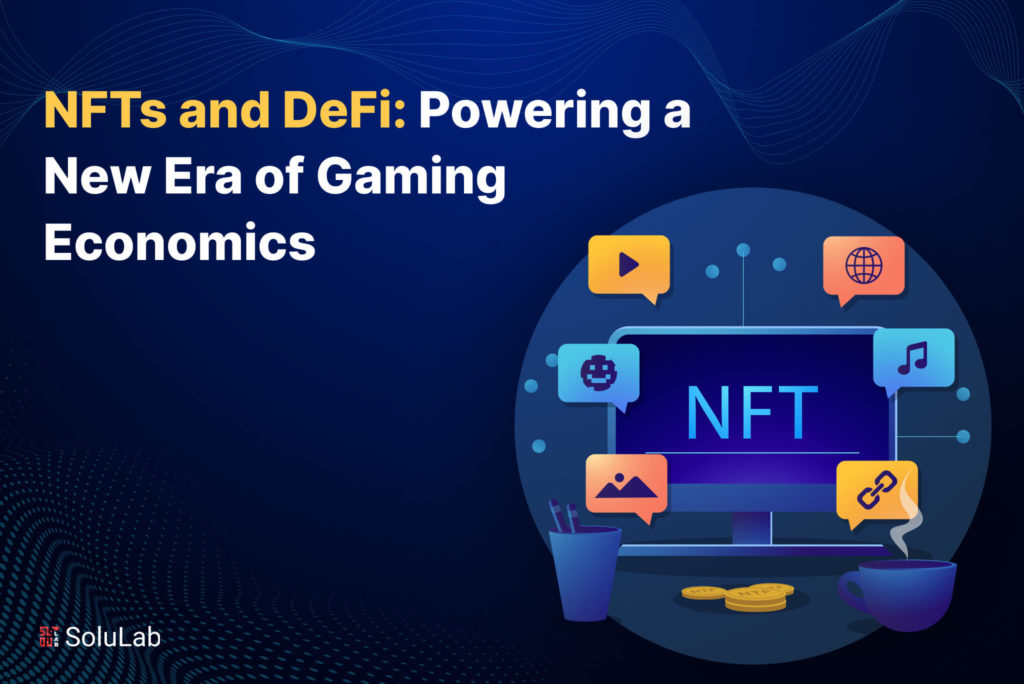
In today’s rapidly evolving digital landscape, two revolutionary concepts have emerged to redefine the way we perceive ownership, value, and participation: Non-Fungible Tokens (NFTs) and Decentralized Finance (DeFi). While NFTs have sparked a craze in the art world by transforming unique digital assets into tradable commodities, DeFi has been disrupting traditional finance by ushering in decentralized financial systems. But what happens when these two powerful forces intersect?
This blog delves into the exciting convergence of NFTs and DeFi, exploring how they are reshaping the new era of gaming economics and the broader digital economy. So, let’s get started!
The Intersection of NFTs and DeFi
The intersection of NFTs (Non-Fungible Tokens) and DeFi (Decentralized Finance) represents a groundbreaking fusion of technologies that promise to revolutionize how we perceive, trade, and utilize digital assets. Let’s delve deeper into this fascinating convergence:
- NFTs Redefining Ownership: NFTs, as unique digital tokens, have enabled the representation of ownership in the digital realm like never before. In the context of gaming, this means that in-game assets, characters, skins, and more can be tokenized as NFTs, endowing players with true ownership. This, in turn, unlocks new economic opportunities as gamers can buy, sell, and trade their virtual items, thus creating a real market for digital collectibles.
- DeFi’s Decentralized Financial Infrastructure: DeFi, on the other hand, has ushered in a decentralized financial ecosystem that operates without intermediaries like banks. DeFi ecosystem protocols leverage blockchain technology to create trustless systems for lending, borrowing, trading, and yield farming. This has enormous implications for gaming, as it allows for decentralized marketplaces for in-game assets, providing players with the ability to trade with greater autonomy and reduced fees.
- NFTs as Collateral: One of the most intriguing aspects of this intersection is the concept of using Non-Fungible Tokens (NFTs) as collateral within DeFi. Gamers can lock up their valuable NFTs as collateral to secure loans or earn interest. This not only provides liquidity to gamers but also introduces a dynamic where in-game assets can be leveraged in the broader financial ecosystem.
- Decentralized Exchanges for NFTs: The rise of decentralized exchanges (DEXs) specifically designed for NFTs further exemplifies this intersection. These DEXs allow users to seamlessly trade NFTs, often with minimal fees and without the need for intermediaries. This enhances liquidity in the NFT market, making it easier for gamers to buy, sell, and speculate on virtual items.
- Fractionalization and NFT Pools: DeFi introduces the concept of fractional ownership of assets, and this is now being applied to NFTs. Gamers can collectively own NFTs through NFT pools or fractionalization, which is a game-changer in terms of access and investment in high-value virtual assets.
The fusion of NFTs and DeFi isn’t just a technological novelty; it’s altering the very fabric of digital economies, particularly in gaming. It’s paving the way for new economic models that allow gamers to monetize their skills and investments in virtual worlds, developers to fund projects in innovative ways, and investors to explore new horizons in asset ownership and trading. As we delve further into this blog, we’ll see how this intersection is catalyzing the “play-to-earn” phenomenon and redefining the gaming landscape in profound ways.
The Significance of Gaming in the Digital Economy
Gaming has ascended from a form of entertainment to a colossal industry that now plays a central role in the digital economy. With a market value surpassing $200 billion, it has outgrown traditional entertainment sectors and is becoming a dominant cultural force. Beyond its financial prowess, gaming is a wellspring of innovation, influencing technological advancements, from cutting-edge graphics and processing power to the development of virtual and augmented reality. These innovations often find applications in fields far beyond gaming, making it an essential driver of broader technological evolution.
Furthermore, gaming’s impact extends into the realms of education, social connection, and entrepreneurship. Gamification and serious games are transforming the way we learn and develop skills, while gaming’s capacity to foster social communities, friendships, and support networks is strengthening its social significance. The rise of content creators and streamers, drawing vast audiences on platforms like Twitch and YouTube, showcases how gaming has created new economic opportunities, leading to digital entrepreneurship. As the concept of the metaverse gains ground, gaming stands at the forefront, providing the infrastructure and user base for this connected digital universe. In essence, gaming is no longer confined to a screen; it is a driving force shaping the very fabric of the digital economy.
NFTs in Gaming
NFTs, or Non-Fungible Tokens, have taken the digital world by storm, and the gaming industry is no exception. To understand their impact, it’s crucial to grasp the concept of NFTs.
NFTs are fundamentally digital assets that indicate ownership of a one-of-a-kind object or piece of information. The non-fungibility of NFTs distinguishes them from regular cryptocurrencies such as Bitcoin or Ethereum. In other words, each NFT is one-of-a-kind, making it impossible to interchange with other tokens on a one-to-one basis. This uniqueness is made possible through blockchain technology, which records and verifies the authenticity of these digital assets.
How NFTs are Used in the Gaming World?
The gaming industry has seamlessly integrated NFTs into its ecosystem, offering players unprecedented opportunities and experiences. Here are some key ways in which NFTs are transforming the gaming landscape:
- Ownership of In-Game Assets: NFTs allow gamers to have true ownership of in-game items, characters, skins, and other digital assets. Previously, players merely had a license to use these items within the game, but NFTs enable them to buy, sell, and trade these assets as they would physical collectibles.
- Scarce and Valuable Items: Just like rare physical collectibles can be highly valuable, NFT-based in-game items can be scarce and desirable. Gamers often seek out limited-edition NFT items, which can appreciate in value over time.
- Interoperability Between Games: Some NFTs are designed to be interoperable, meaning they can be used across multiple games and virtual worlds. This creates exciting possibilities for cross-game economies, where your sword from one game could be used in another.
- Player-Generated Content: Gamers can create and sell their content as NFTs. This empowers creators to monetize their creations and gives players a sense of involvement in the gaming universe.
- Provably Rare Collectibles: NFTs provide transparency in proving the rarity and authenticity of collectibles. This can be especially appealing to collectors and investors in the gaming world.
Overall, NFT in gaming has evolved from being a mere novelty to a fundamental component of the industry. They grant players greater control over their gaming experiences and open up a world of possibilities for virtual economies and creativity.
DeFi in Gaming
Decentralized Finance (DeFi) has emerged as a game-changing force in the financial sector. It’s a system that aims to decentralize traditional financial services, enabling peer-to-peer transactions, removing intermediaries, and promoting transparency. DeFi operates on blockchain technology, similar to cryptocurrencies like Bitcoin and Ethereum. However, it goes beyond digital currencies to offer a wide range of financial services, including lending, borrowing, staking, yield farming, and more.
The Integration of DeFi With Gaming
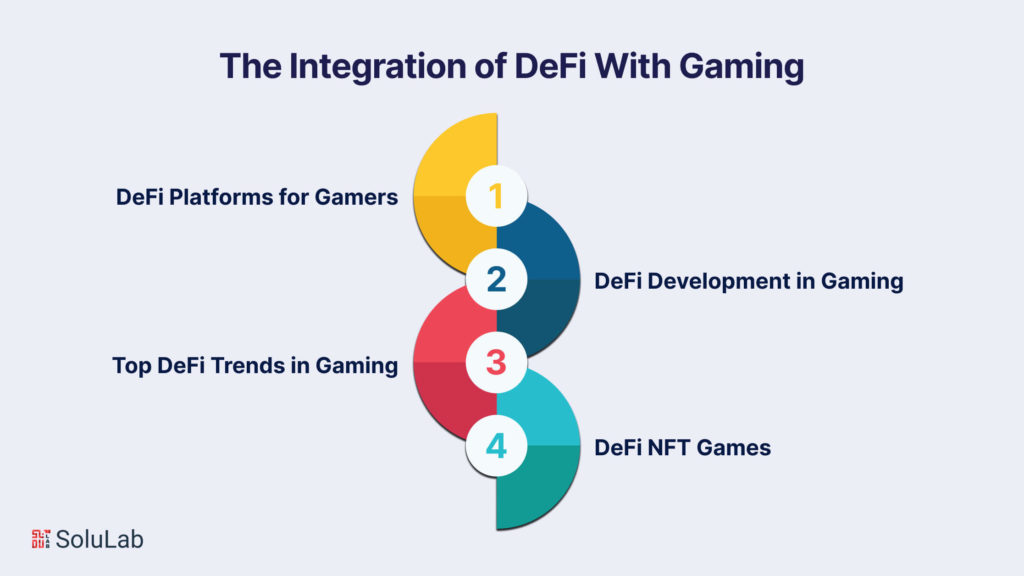
In recent years, the gaming industry has begun to realize the potential of integrating DeFi into its ecosystem. This convergence of DeFi and gaming is creating exciting new opportunities for players and developers alike. Here’s how these two worlds are coming together:
- DeFi Platforms for Gamers: DeFi platforms are being customized to cater to gamers. These platforms offer services such as in-game asset lending, borrowing, and yield farming. Gamers can earn rewards and income by participating in DeFi activities within the gaming ecosystem.
- DeFi Development in Gaming: Game developers are incorporating DeFi development features into their games, making in-game economies more decentralized. For instance, players can lend their in-game assets to others and earn interest through smart contracts, similar to traditional DeFi lending.
- Top DeFi Trends in Gaming: Games that leverage DeFi often follow the top trends in the DeFi space. This can include liquidity pools, decentralized exchanges, governance tokens, and more. Gamers can actively participate in these trends, potentially reaping financial benefits from their in-game activities.
- DeFi NFT Games: The combination of DeFi and NFTs has given rise to DeFi NFT games. These games often feature NFTs that represent in-game assets or characters, which can be used in DeFi activities. Players can trade these NFTs or use them as collateral for loans.
Benefits of Decentralized Finance for Gamers
The integration of DeFi with gaming brings several benefits to players:
- Financial Freedom: Gamers gain more control over their in-game assets and the ability to monetize them. They can earn income, trade assets, and participate in various DeFi activities.
- Cross-Game Economies: DeFi allows gamers to use their assets across different games and platforms. This cross-game interoperability creates opportunities for building diversified in-game portfolios.
- Transparency and Security: DeFi operates on blockchain technology, providing transparency and security. Players can trust the integrity of in-game transactions and DeFi activities.
- Community Engagement: DeFi and gaming often involve active communities. Gamers can collaborate on governance decisions, stake tokens in their favorite games, and actively participate in shaping the gaming experience.
The integration of DeFi and gaming holds immense promise for the gaming industry. As DeFi lending platforms and DeFi NFT games continue to evolve, gamers can expect more opportunities to participate in decentralized finance while enjoying their favorite virtual worlds.
How NFTs and DeFi Complement Each Other in Gaming?
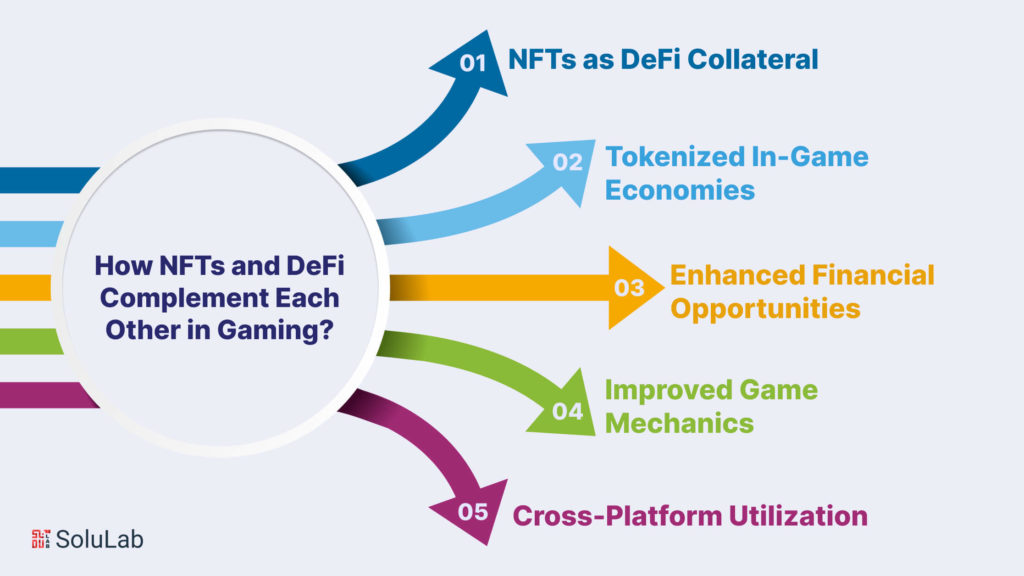
The synergy between Non-Fungible Tokens (NFTs) and Decentralized Finance (DeFi) in the gaming sphere is proving to be a game-changer. Their combination creates a potent force, unlocking a new dimension of possibilities for both players and developers.
- NFTs as DeFi Collateral: NFTs serve as unique digital assets, providing authenticity, ownership, and scarcity. When these NFTs are used as collateral within the DeFi ecosystem, gamers can leverage their valuable in-game assets to access DeFi services like borrowing, lending, and yield farming. For instance, players can lock their rare in-game NFTs into smart contracts to secure loans or earn interest, all without losing possession of the assets.
- Tokenized In-Game Economies: NFTs allow in-game items, characters, or land to be tokenized and authenticated on the blockchain. When these NFTs are integrated into DeFi protocols, they can become tradeable assets or staking instruments. This tokenization within DeFi platforms allows for the creation of robust in-game economies, where players can trade, lend, or stake their NFTs for additional value or rewards.
- Enhanced Financial Opportunities: The fusion of NFTs and DeFi opens doors to new financial opportunities within gaming. Gamers can potentially earn passive income by staking their NFTs, lending rare in-game items, or participating in liquidity pools formed around these NFTs. Additionally, these integrated systems allow for the development of sophisticated gaming economies, where NFT-based assets can earn yield, further incentivizing players.
- Improved Game Mechanics: DeFi’s concepts, such as decentralized governance, yield generation, and liquidity provision, can add intricate and rewarding mechanics to games using NFTs. Smart contracts can govern in-game economic models, offering players the chance to participate in community-based decision-making and gain from their contributions to the game ecosystem.
- Cross-Platform Utilization: The amalgamation of NFTs and DeFi can transcend individual games, enabling players to use their NFT assets or earnings across multiple gaming platforms. This cross-platform utility empowers gamers to explore diverse gaming experiences while maintaining the value of their digital assets within the broader gaming ecosystem.
The seamless integration of NFTs and DeFi in gaming illustrates their mutual enhancement. As NFTs bring unique ownership and authenticity, DeFi amplifies these assets’ utility, turning them into active components of a decentralized financial ecosystem within the gaming world. This combination not only expands financial possibilities for players but also enriches the gaming experience as a whole.
Benefits for Gamers
Gamers are at the forefront of the NFTs and DeFi revolution within the gaming industry. The convergence of these technologies offers a plethora of benefits that empower players in exciting and innovative ways.
1. Ownership of In-Game Assets
One of the most notable advantages for gamers is the newfound ownership of in-game assets. Traditionally, players merely had a license to use digital items within a game. With NFTs, they gain true ownership of these assets. Whether it’s a rare sword, a unique character skin, or a parcel of virtual land, gamers can securely claim their digital possessions. NFTs serve as irrefutable proof of ownership, are recorded on the blockchain, and can be bought, sold, or traded like physical collectibles. This empowers players with a sense of agency over their in-game assets, which can be appreciated in value over time.
2. Earning Opportunities Through Gaming
NFTs and DeFi provide gamers with unprecedented earning opportunities. Here’s how these technologies enrich the gaming experience:
- Income from In-Game Activities: Gamers can earn income by engaging in in-game activities, such as completing quests, participating in competitions, or contributing to the virtual world’s development. The rewards for their efforts are often distributed in the form of NFTs or cryptocurrencies, which can be traded or staked within DeFi platforms for additional income.
- NFT Game Development Services: For creative gamers, NFT game development services have opened up avenues to design, develop, and monetize their virtual creations. By developing their games or NFT-based assets, gamers can generate income by selling them to other players or collectors.
- Collateral for DeFi Loans: Gamers can use their valuable NFTs as collateral to secure loans within the DeFi ecosystem. This allows them to unlock liquidity while still retaining ownership of their prized in-game assets.
- Trading and Speculation: NFTs can be traded on various marketplaces, and their values can be appreciated over time, particularly if they are rare or have historical significance in the gaming world. Gamers can invest in NFTs or speculate on their value, turning their gaming hobby into a source of potential financial growth.
3. NFT Game Development Companies
As NFTs and DeFi continue to gain traction, a burgeoning ecosystem of NFT game development companies is emerging. Gamers can benefit from this trend in various ways. They can collaborate with these companies to create and monetize their game assets or explore new gaming experiences crafted by these developers.
In essence, the combination of NFTs and DeFi not only enhances the gaming experience but also transforms it into a realm of financial opportunities and ownership rights. Gamers are no longer mere participants; they are now empowered creators and investors in the evolving world of NFT-based games and decentralized finance.
Challenges and Concerns in Implementing NFTs and DeFi in Gaming
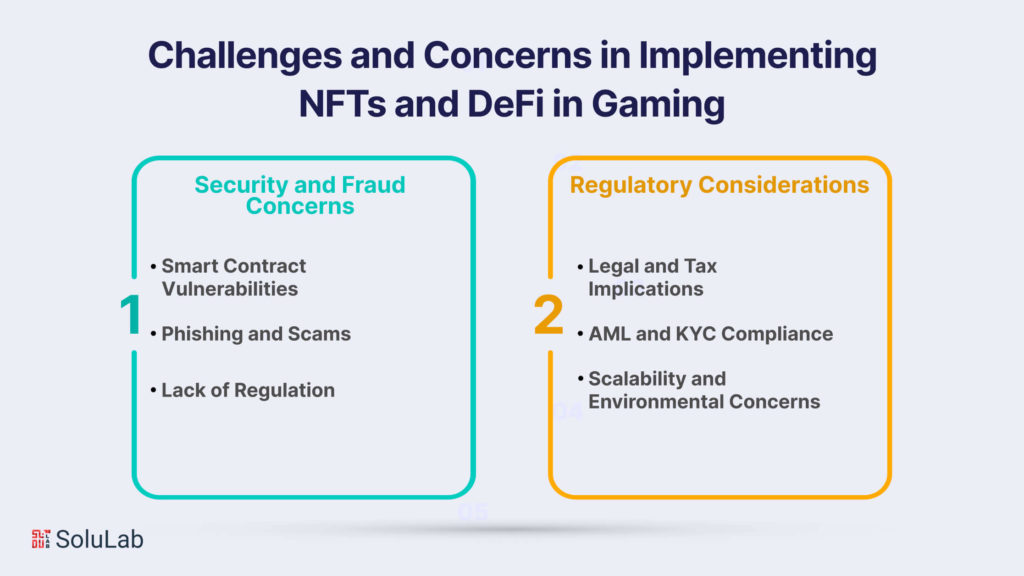
While the integration of NFTs and DeFi in gaming presents a myriad of exciting possibilities, it also comes with its share of challenges and potential risks that both players and developers should be aware of. Here, we delve into some of these concerns:
1. Security and Fraud Concerns
- Smart Contract Vulnerabilities: NFTs and DeFi are built on smart contracts, which are not immune to vulnerabilities or exploits. Malicious actors can find and exploit weaknesses in these contracts, potentially resulting in financial losses for gamers. It’s crucial to conduct thorough audits of smart contracts and keep them up to date to mitigate these risks.
- Phishing and Scams: The relatively new nature of NFTs and DeFi has attracted opportunistic scammers. Gamers may encounter phishing attempts, fake NFT marketplaces, or fraudulent DeFi platforms. Staying vigilant and using reputable services are essential precautions.
- Lack of Regulation: The decentralized nature of DeFi and NFTs often means a lack of oversight and regulation. While this offers freedoms, it also leaves the space vulnerable to fraudulent schemes, rug pulls, and other illicit activities. As a result, investors and players are urged to do their due diligence before participating in any project or transaction.
2. Regulatory Considerations
- Legal and Tax Implications: The intersection of NFTs, DeFi, and gaming introduces complex legal and tax questions. Different jurisdictions may have varying definitions of NFTs, cryptocurrencies, and their implications for taxation. Gamers should be aware of their responsibilities regarding the acquisition, sale, and use of NFTs, as well as DeFi activities.
- AML and KYC Compliance: Anti-Money Laundering (AML) and Know Your Customer (KYC) regulations may come into play when using DeFi platforms or engaging in large NFT transactions. These requirements can impact the anonymity that many users in the crypto space value. As regulations evolve, users must adapt to stay compliant.
- Scalability and Environmental Concerns: DeFi and NFTs, particularly those built on the Ethereum blockchain, have faced challenges related to scalability and high gas fees. These issues can affect the usability and affordability of gaming within these ecosystems. Additionally, the environmental impact of blockchain technology, notably proof-of-work blockchains, raises sustainability concerns.
It’s important for gamers and developers to navigate these challenges with a combination of vigilance and responsible usage. Staying informed, practicing due diligence, and adhering to the best security practices can help mitigate risks and foster a safer and more robust ecosystem for NFTs, DeFi, and gaming. Furthermore, as the regulatory landscape continues to evolve, staying compliant with relevant laws is paramount to ensure a seamless and secure experience.
Future Prospects of Implementing NFTs and DeFi in Gaming
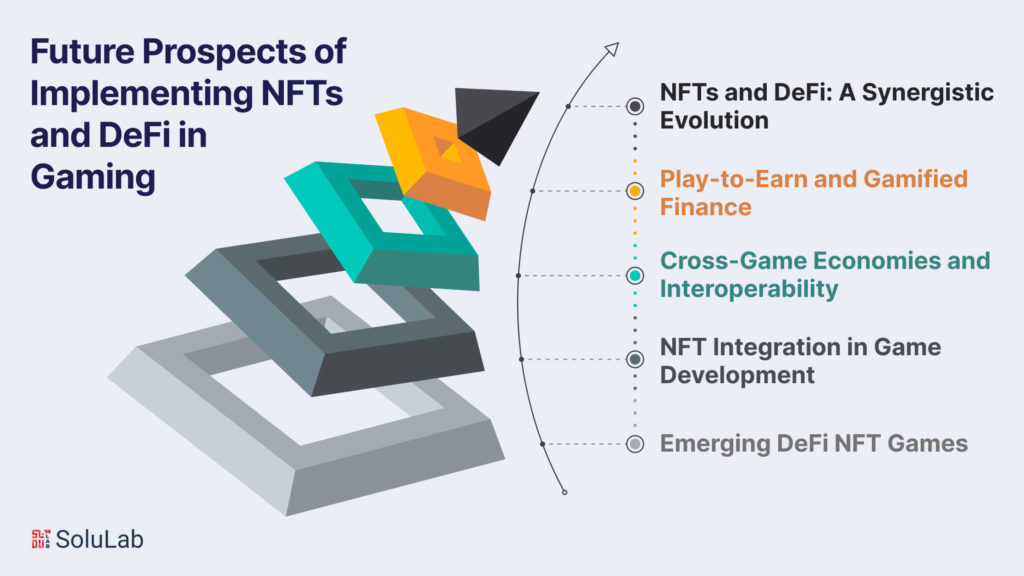
The future of the gaming industry is being dynamically shaped by the convergence of Non-Fungible Tokens (NFTs) and Decentralized Finance (DeFi). As these technologies continue to gain momentum, their impact on gaming is expected to be transformative.
-
NFTs and DeFi: A Synergistic Evolution
The synergy of NFTs and DeFi in gaming is anticipated to deepen. NFTs offer unique ownership of in-game assets, while DeFi provides a robust financial ecosystem. This combination is set to create even more complex and interactive in-game economies.
-
Play-to-Earn and Gamified Finance
The concept of “play-to-earn” is on the rise. Gamers can earn rewards, cryptocurrencies, and valuable NFTs by participating in games and DeFi activities. This gamified approach to finance may blur the lines between traditional gaming and financial services, offering players incentives to be more active within both ecosystems.
-
Cross-Game Economies and Interoperability
Cross-game interoperability will gain further prominence. Gamers will be able to use their NFT assets, such as characters, skins, or in-game items, across multiple games and platforms. This will lead to the development of comprehensive, cross-game economies where assets can be utilized seamlessly.
-
NFT Integration in Game Development
NFTs are expected to become an integral part of game development. Game studios may incorporate NFTs as core features, enabling players to have true ownership of in-game assets and making the creation of user-generated content more rewarding. NFT-based games are likely to proliferate, offering players new gaming experiences with the potential for financial benefits.
-
Emerging DeFi NFT Games
The emergence of DeFi NFT games, which integrate the principles of decentralized finance with NFTs, will continue to expand. These games often feature NFTs representing in-game assets that players can trade, stake, or use as collateral for loans. The synergy between DeFi and NFTs in gaming is expected to provide a growing array of financial opportunities for players.
Concluding Remarks
In the entwined realms of gaming, Non-Fungible Tokens (NFTs) and Decentralized Finance (DeFi) have sparked a revolution. The fusion of these groundbreaking technologies is paving the way for a new era where players are not merely gamers but active participants in dynamic economies. The ownership of in-game assets, the prospect of earning through play, and the amalgamation of finance with gaming experiences are reshaping how we perceive digital entertainment. However, amidst the promises of this synergy, challenges like security concerns and regulatory ambiguities loom, requiring vigilance and adaptation from gamers and developers alike.
The future of NFTs and DeFi in gaming is as promising as it is transformative. As these technologies continue to evolve, the gaming landscape is on the brink of a monumental shift, where the traditional boundaries between gaming and financial ecosystems are blurring. The potential for cross-game economies, player-centric game development, and emerging DeFi NFT games point to a future that’s not just about entertainment but also about financial empowerment within gaming. Yet, in this burgeoning era of possibilities, education, caution, and adaptability are keys to embracing the revolution responsibly.
At SoluLab, as an NFT game development company and a DeFi development company, we stand at the forefront of integrating NFTs and DeFi into gaming experiences. Our expertise lies in delivering innovative solutions that bridge the realms of gaming and these transformative technologies. With tailored NFT game development services, pioneering DeFi integrations, and a commitment to pioneering the future of gaming, we invite you to take the first step toward this groundbreaking journey. Join us in crafting immersive gaming experiences that redefine ownership, finance, and the thrill of gaming. Contact us today and let’s redefine gaming together!
FAQs
1. What are NFTs, and how do they work in gaming?
NFTs, or Non-Fungible Tokens, are digital assets that represent unique ownership of items, characters, or in-game content. In gaming, NFTs allow players to truly own their in-game assets, which can be bought, sold, and traded. Each NFT is verifiably unique and is typically recorded on a blockchain, ensuring the authenticity and scarcity of the asset.
2. How do gamers earn money through NFTs and DeFi in gaming?
Gamers can earn money by participating in play-to-earn games that reward them with cryptocurrencies, NFTs, or other valuable in-game assets. They can also earn by lending their NFTs within DeFi platforms, staking assets, or creating and selling NFT-based game content. The combination of NFTs and DeFi opens up numerous opportunities for players to monetize their gaming activities.
3. Are there security risks involved with NFTs and DeFi in gaming?
Yes, there are security risks, including smart contract vulnerabilities, phishing scams, and a lack of regulation. It’s essential for players to be cautious and conduct due diligence when interacting with NFTs and DeFi platforms. Using reputable services, keeping software up to date, and staying informed about potential risks are vital precautions.
4. How do NFTs and DeFi impact traditional game development?
NFTs are transforming traditional game development by allowing players to own in-game assets and creating a new dimension of player involvement. Game studios are integrating NFTs into their games, incentivizing user-generated content, and making game economies more player-centric. DeFi is also being incorporated into game mechanics, enhancing financial opportunities for players.
5. What is the role of SoluLab in implementing NFTs and DeFi in gaming?
SoluLab specializes in NFT game development services and the integration of DeFi in gaming experiences. We work with game developers to create innovative solutions that leverage the power of NFTs and DeFi. If you’re looking to harness the potential of NFTs and DeFi in your gaming projects, SoluLab is your trusted partner for pioneering the future of gaming. Contact us today to start redefining gaming and finance together.




